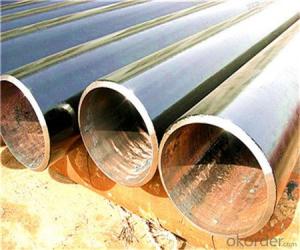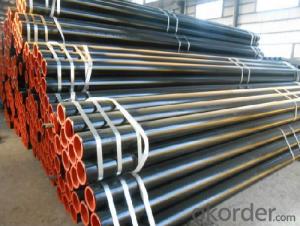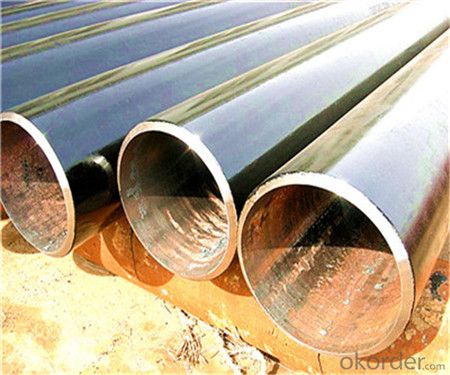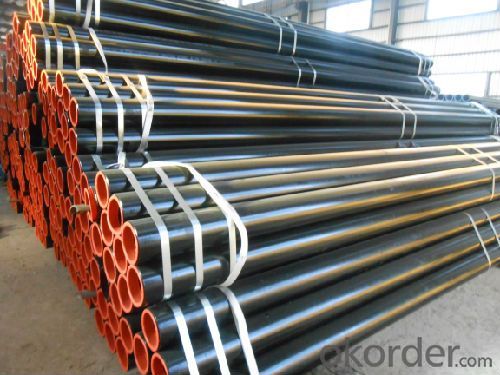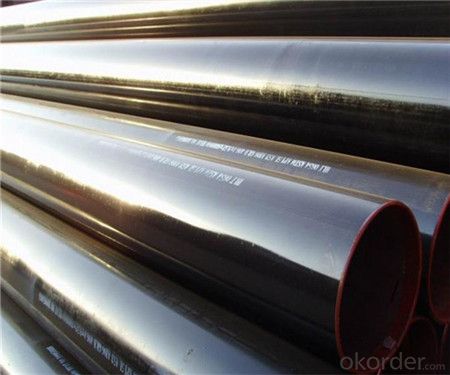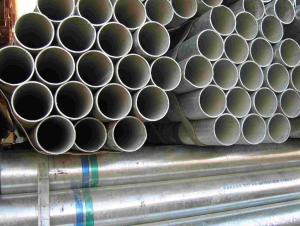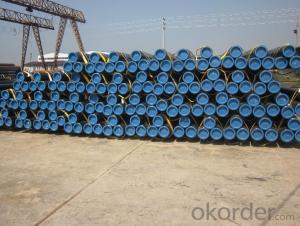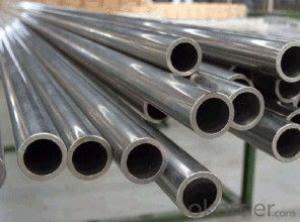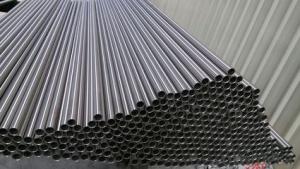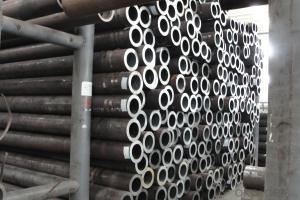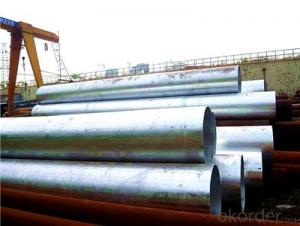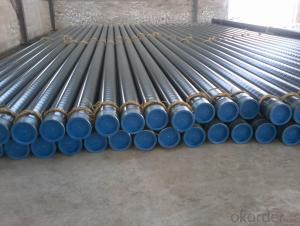2016 carbon Seamless Steel Pipe low price good quality
- Loading Port:
- Tianjin
- Payment Terms:
- TT or LC
- Min Order Qty:
- 30 m.t.
- Supply Capability:
- 12000 m.t./month
OKorder Service Pledge
OKorder Financial Service
You Might Also Like
1、Structure of Carbon Seamless Steel Pipe API 5L of 4 Inch:
Seamless pipe is formed by drawing a solid billet over a piercing rod to create the hollow shell.
As the manufacturing process does not include any welding, seamless pipes are perceived to be stronger and more reliable.
Historically seamless pipe was regarded as withstanding pressure better than other types, and was often more easily available than welded pipe.
Standard: GB3087: Seamless Steel Tubes for Low and Medium Pressure Boiler
2、Main Features of the Seamless Pipe API 5L of 4 Inch
• High manufacturing accuracy
• High strength
• Small inertia resistance
• Strong heat dissipation ability
• Good visual effect
• Reasonable price
3、Seamless Pipe API 5L of 4 Inch Specification:
Standard | GB, DIN, ASTM ASTM A106-2006, ASTM A53-2007 |
Grade | 10#-45#, 16Mn 10#, 20#, 45#, 16Mn |
Thickness | 8 - 33 mm |
Section Shape | Round |
Outer Diameter | 133 - 219 mm |
Place of Origin | Shandong, China (Mainland) |
Secondary Or Not | Non-secondary |
Application | Hydraulic Pipe |
Technique | Cold Drawn |
Certification | API |
Surface Treatment | factory state or painted black |
Special Pipe | API Pipe |
Alloy Or Not | Non-alloy |
Length | 5-12M |
Outer Diameter | 21.3-610mm |
Grade | 20#, 45#, Q345, API J55, API K55, API L80, API N80, API P110, A53B |
Standard | ASME, ASTM |
4、Packaging & Delivery
Packaging Details: | seaworthy package,bundles wrapped with strong steel strip |
Delivery Detail: | 15-30days after received 30%TT |
5、FAQ of Seamless Pipe API 5L of 4 Inch:
Q1: Why buy Materials & Equipment from OKorder.com?
A1: All products offered byOKorder.com are carefully selected from China's most reliable manufacturing enterprises. Through its ISO certifications, OKorder.com adheres to the highest standards and a commitment to supply chain safety and customer satisfaction.
Q2: How do we guarantee the quality of our products?
A2: We have established an advanced quality management system which conducts strict quality tests at every step, from raw materials to the final product. At the same time, we provide extensive follow-up service assurances as required.
Q3: How soon can we receive the product after purchase?
A3: Within three days of placing an order, we will begin production. The specific shipping date is dependent upon international and government factors, but is typically 7 to 10 workdays.
Q4: What makes stainless steel stainless?
A4: Stainless steel must contain at least 10.5 % chromium. It is this element that reacts with the oxygen in the air to form a complex chrome-oxide surface layer that is invisible but strong enough to prevent further oxygen from "staining" (rusting) the surface. Higher levels of chromium and the addition of other alloying elements such as nickel and molybdenum enhance this surface layer and improve the corrosion resistance of the stainless material.
Q5: Is there a difference in thermal conductivity between stainless steel and steel?
A5: Yes. Stainless Steel has a lower thermal conductivity rate than steel; approximately 1/3 to 1/5th depending on the material.
Q6: Is there a difference in electrical conductivity between stainless steel and steel?
A6: Yes. Steel is generally more conductive than stainless steel. Steel has resistivity in the range of 10~20Ωm, while stainless has a resistivity of approximately 60~72Ωm.
6、Seamless Pipe API 5L of 4 Inch Images:
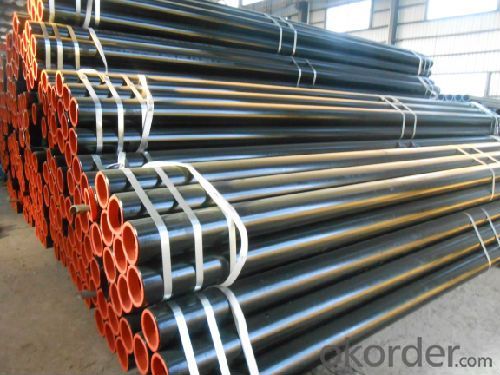
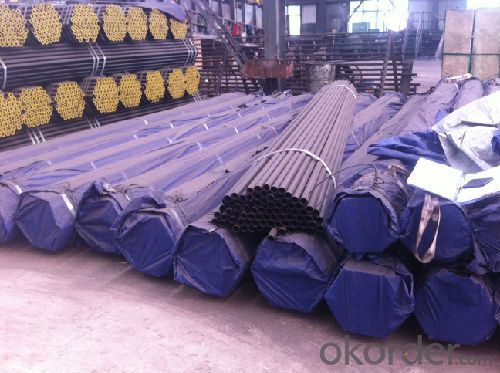
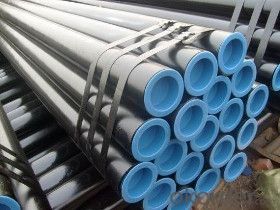
- Q: What is the role of steel pipes in the construction of stadiums?
- Steel pipes play a crucial role in the construction of stadiums as they are used for various purposes including structural support, drainage systems, and the installation of utilities such as water, gas, and electrical lines. These pipes provide the necessary strength and durability to support the weight of the stadium's roof, seating areas, and other infrastructure. Additionally, steel pipes enable efficient transportation of liquids and gases, ensuring proper functioning of the stadium's facilities.
- Q: What are the different methods of pipe inspection for steel pipes?
- There are several methods of pipe inspection that can be used for steel pipes. Some of the commonly used methods are as follows: 1. Visual Inspection: This is the most basic form of pipe inspection where a trained inspector visually examines the exterior and interior of the pipe to identify any visible defects or abnormalities. This method is often used as a preliminary inspection before more advanced techniques are employed. 2. Magnetic Particle Inspection (MPI): MPI involves applying a magnetic field to the steel pipe and then applying iron particles to the surface. Any surface cracks or defects in the pipe will cause a leakage of magnetic flux, which can be detected by the inspector. This method is particularly effective in identifying surface defects in ferromagnetic materials. 3. Ultrasonic Testing (UT): UT is a non-destructive testing method that uses high-frequency sound waves to detect internal defects or anomalies in steel pipes. A transducer is used to send ultrasonic waves into the pipe, and the reflections or echoes of the sound waves are analyzed to determine the presence of defects such as corrosion, cracks, or wall thickness variations. 4. Radiographic Testing (RT): In this method, X-rays or gamma rays are used to create an image of the internal structure of the steel pipe. The X-rays or gamma rays pass through the pipe, and the resulting image can reveal any defects, such as cracks, corrosion, or weld discontinuities. This method is commonly used for inspecting welded joints. 5. Eddy Current Testing (ECT): ECT is a non-destructive testing technique that uses electromagnetic induction to detect surface and near-surface defects in steel pipes. A coil carrying an alternating current is passed over the pipe's surface, and any changes in the electrical conductivity or magnetic field caused by defects are detected and analyzed. 6. Acoustic Emission Testing (AET): AET is a method that detects and analyzes the high-frequency acoustic signals emitted by materials when they undergo deformation or damage. In the case of steel pipes, AET can be used to monitor and identify defects such as cracks, leaks, or corrosion by analyzing the acoustic signals emitted during service or under stress. These are just a few of the commonly used methods of pipe inspection for steel pipes. The choice of method depends on various factors such as the type of defect being looked for, the accessibility of the pipe, the desired level of sensitivity, and the cost and time constraints. It is often recommended to use a combination of inspection techniques to ensure a thorough assessment of the steel pipes.
- Q: Are steel pipes suitable for use in pharmaceutical industries?
- Yes, steel pipes are suitable for use in pharmaceutical industries. Steel pipes are known for their durability, strength, and resistance to corrosion, making them ideal for transporting various pharmaceutical materials and fluids safely and hygienically. Additionally, steel pipes can withstand high pressure and temperature conditions, ensuring the integrity and efficiency of pharmaceutical manufacturing processes.
- Q: Can steel pipes be used for stormwater management systems?
- Yes, steel pipes can be used for stormwater management systems. Steel pipes are commonly used in stormwater management systems due to their durability, strength, and resistance to corrosion. They can efficiently handle the flow of stormwater and are suitable for underground installation, making them a reliable choice for managing stormwater runoff.
- Q: What are the potential health hazards associated with steel pipe installation?
- Some potential health hazards associated with steel pipe installation include exposure to hazardous chemicals used in the coating or treatment of the pipes, inhalation of dust or fumes generated during cutting or welding, and physical injuries due to accidents or mishandling of heavy equipment. Additionally, improper handling or disposal of waste materials and contaminated water can pose environmental health risks. It is important to follow proper safety protocols, use personal protective equipment, and ensure proper ventilation and waste management to mitigate these hazards.
- Q: How are steel pipes used in the manufacturing of boilers?
- Steel pipes are an integral component in the manufacturing of boilers due to their strength, durability, and heat-resistant properties. Boilers are used to generate steam or heat water for various industrial and commercial applications. Steel pipes are primarily used in the construction of boiler tubes, which serve as the main heat transfer medium. These tubes are subjected to high temperatures and pressure, making it crucial to use a material that can withstand these extreme conditions. Steel, with its excellent mechanical properties and resistance to corrosion, is the ideal material for this purpose. The manufacturing process of boilers involves forming the steel pipes into specific shapes and sizes to create the boiler tubes. These tubes are then connected to form a network of channels through which hot gases or water flow. The steel pipes used in this process are often seamless or welded, depending on the requirements of the boiler design. The steel pipes used in boilers must meet stringent quality standards to ensure the safety and efficiency of the system. They are tested for their ability to withstand high pressure, temperature, and corrosion. Additionally, they undergo various inspections and tests, such as ultrasonic testing and radiographic examination, to detect any defects or flaws that could compromise the boiler's performance. In summary, steel pipes play a crucial role in the manufacturing of boilers by serving as the primary material for boiler tubes. Their strength, durability, and heat-resistant properties make them suitable for withstanding high temperatures and pressure. These pipes undergo rigorous testing to ensure their quality and reliability in creating efficient and safe boiler systems.
- Q: Can galvanized pipe be welded with seamless steel tube? What should I do to connect?
- To look at the use of concrete after welding, if the stress is relatively large and thin galvanized pipe wall is recommended to not use welding, if the requirement is not high Po mouth welding should be welding depends on galvanized pipe material selection electrode generally no sealing material are 20
- Q: What are the factors affecting the lifespan of steel pipes?
- There are several factors that can affect the lifespan of steel pipes. These include the quality of the steel used, the thickness of the pipe wall, the presence of corrosive substances or environments, the level of maintenance and care, and the exposure to extreme temperatures or physical stress.
- Q: What is the difference between internal threading and external threading of steel pipes?
- Internal threading and external threading are two different methods used to create threads on steel pipes. The main difference between them lies in the location of the threads. Internal threading refers to the process of cutting threads on the inside surface of a steel pipe. This method involves using a tool or a die to remove material from the inner diameter of the pipe, creating a helical groove. The resulting threads can be used to connect the pipe to other components, such as fittings or valves. On the other hand, external threading involves cutting threads on the outside surface of a steel pipe. This process usually requires the use of a threading die or a lathe to remove material from the outer diameter of the pipe, leaving behind a helical groove. The external threads allow the pipe to be connected to other components or fittings that have corresponding internal threads. The choice between internal and external threading depends on the specific application and the requirements of the project. Internal threading is often preferred when the pipe needs to be connected to components that have external threads, such as fittings or valves. External threading, on the other hand, is typically used when the pipe needs to be connected to components with internal threads, or when the pipe is intended to be screwed into a threaded hole or coupling. In summary, the main difference between internal threading and external threading of steel pipes is the location of the threads – internal threads are cut on the inside surface of the pipe, while external threads are cut on the outside surface. The choice between these methods depends on the specific application and the type of connections required.
- Q: Can steel pipes be used for underground utility lines?
- Yes, steel pipes can be used for underground utility lines. Steel pipes are commonly used for various underground applications, including utility lines for water, gas, and sewage. They are durable, strong, and resistant to corrosion, making them suitable for long-term use in underground environments. Additionally, steel pipes can be easily welded and connected, allowing for efficient installation and maintenance.
Send your message to us
2016 carbon Seamless Steel Pipe low price good quality
- Loading Port:
- Tianjin
- Payment Terms:
- TT or LC
- Min Order Qty:
- 30 m.t.
- Supply Capability:
- 12000 m.t./month
OKorder Service Pledge
OKorder Financial Service
Similar products
Hot products
Hot Searches
Related keywords
